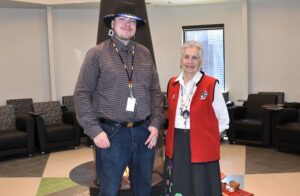Canadore College to combine ceremony and technology to take care of the water

By Kelly Anne Smith
NORTH BAY— Deputy Chief Mike Sawyer of Nipissing First Nation is pleased with the Clean Water Initiative at Canadore College. On April 12, community members gathered to take part in ceremony for the water and to name the water teaching lodge. In the Canadore College Village, the teepee-shaped room with the fireplace has been named Mshibizhiwgamig in Anishinaabemowin, which translates to Great Lynx Lodge in English.
“It’s important to have this lodge within a post-secondary environment,” says Deputy Chief Sawyer. “It allows other nations and our hosting nation to conduct ceremony. As they are starting to learn in education, they are providing the spiritual, emotional, physical, and mental balance for the students. It’s a very stressful time when you are doing post-secondary education and being away from your community, so it gives some sense of comfort being here.”
He adds that having the name in the proper ceremony brings life into that area.
“It gives it identity. It allows students who are trying to find their way as well as young adults. They are going to find their way through ceremony through other Nations that are attending Canadore College. Like our Haudenosaunee brothers and sisters, Wyndat, Chippewa, Odawa, and Pottawatami who are coming into the North Bay area, traditional territory of Nbisiing Anishinabek.”
Deputy Chief Sawyer says in the culture, water is everywhere.
“It’s life. And when you incorporate the technology with our ways, you’re walking in that world of two eyes seeing,” he explains. “We still have to worry about the [colonizers] way of things and how the world is run and stay balanced and grounded in our cultures, in our ways of doing things – knowing, being, and doing – so that we are keeping a balance. As much as we’re learning new things, we’re bringing our traditional older teachings forward in the future as well.”
The Deputy Chief says we need to think about the importance of water itself.
“As we start going into the future, the population is starting to vastly grow. Our water, we have to take care of it. If we don’t take care of the water, it’s not going to take care of us. And there will be no life.”
Canadore College President George Burton says part of the Clean Water Initiative at Canadore is to find practical solutions working with First Nations. He says technologies are under development to be easily transportable to communities.
The manager of Indigenous Research and Development at the First People’s Centre at Canadore College, Carly Renaud, is Anishinaabe of Treaty 9, Matachewan First Nation, and Marten Clan. Renaud says bringing technologies to the communities is important with access to clean water being a prominent issue in Canada. Currently, there are 32 long-term drinking water advisories in 28 Indigenous communities.
“Water needs to be cleaned. We have boil water advisories. Those need to be technologically addressed with the positioning of Indigenous knowledges so that you’re not coming in and treating it as a commodity or a substance, it’s our living relative. I think everyone working on this project has that understanding of it. That’s the most important part for me. We can move forward technologically and traditionally.”
Renaud says a technology framework is being put in place for a demonstration site.
“We are envisioning that students from all different kinds of courses will be able to engage in it. We have the Indigenous Wellness and Addictions Prevention program that we want to work with the demonstration site and talking about water and about the water ceremonies that we are going to be having,” Renaud explains. “We are also going to invite environmental studies students and all kinds of students to see what we are doing with the water. As a college, we have to think about students first. We have to make sure that everything we do here is brought to the students to give them that experience and that opportunity to learn.”
Close to the Mshibizhiwgamig/the Great Lynx Lodge is the Indigenous Wellness and Addictions Preventions classroom, the Elders room, the community kitchen, and a harvest room for sewing, beading, steaming, art, and dressing of animals.
Shawn Chorney, Vice President Enrolment Management, Indigenous and Student Services, says other Indigenous educators joined in the gathering.
“We work with other institutes, so we have First Nations Technical Institute here today from Tyendinaga. And Seven Generations Education Institute from Kenora and Fort Frances delivers some of our programs, they are here as well.”
Chorney added that construction on a long-term care facility on Canadore’s campus will start this summer.
“That’s part of the commitment we’ve made for Indigenous beds in the long-term care facility so that cultural components can happen.”


